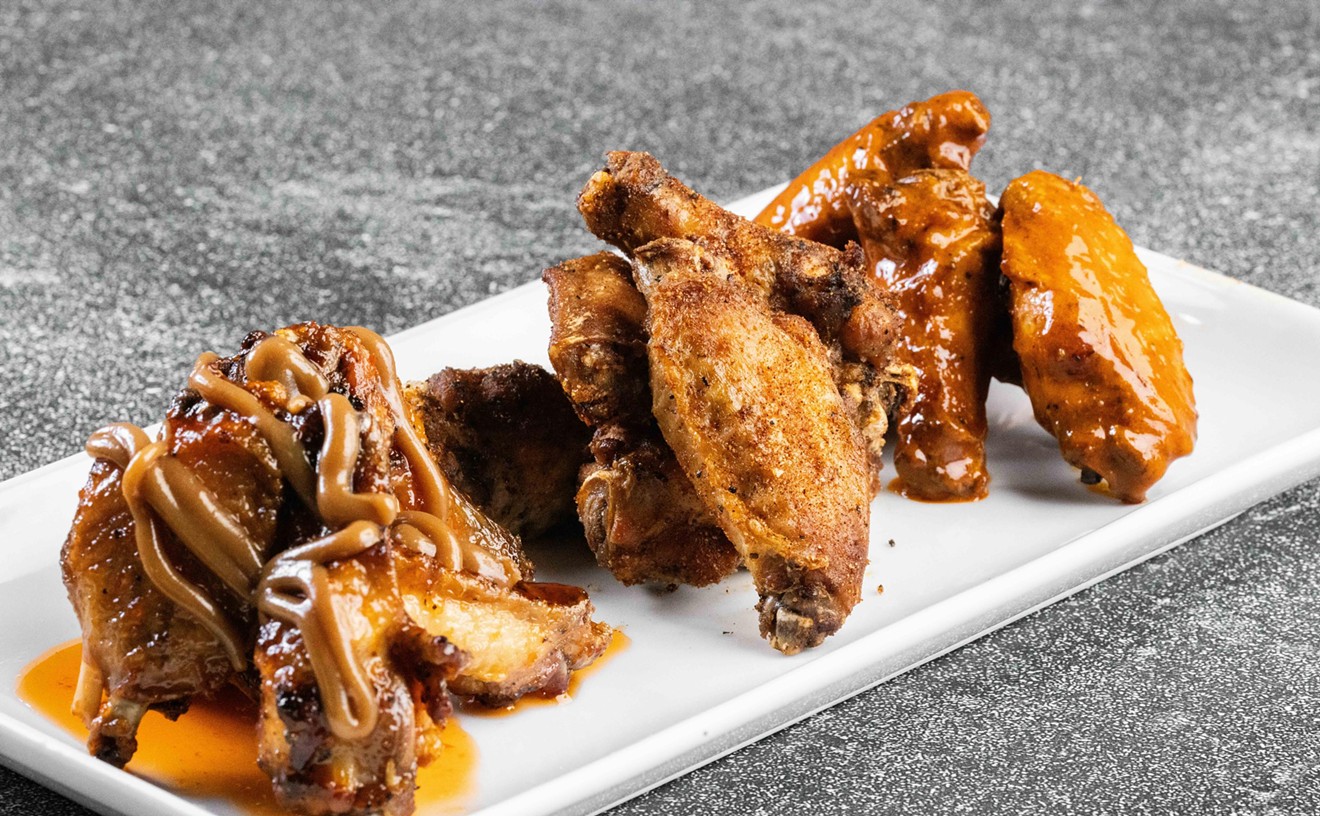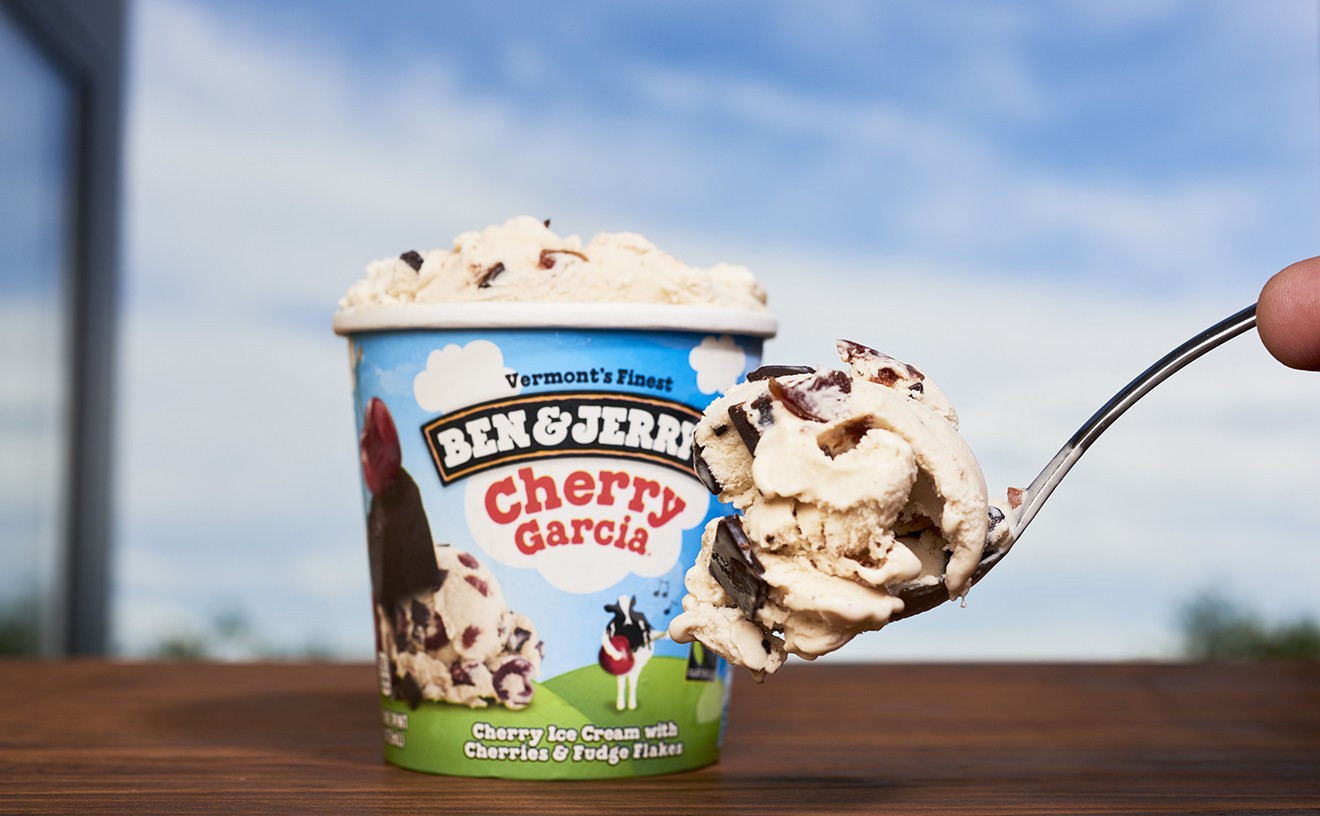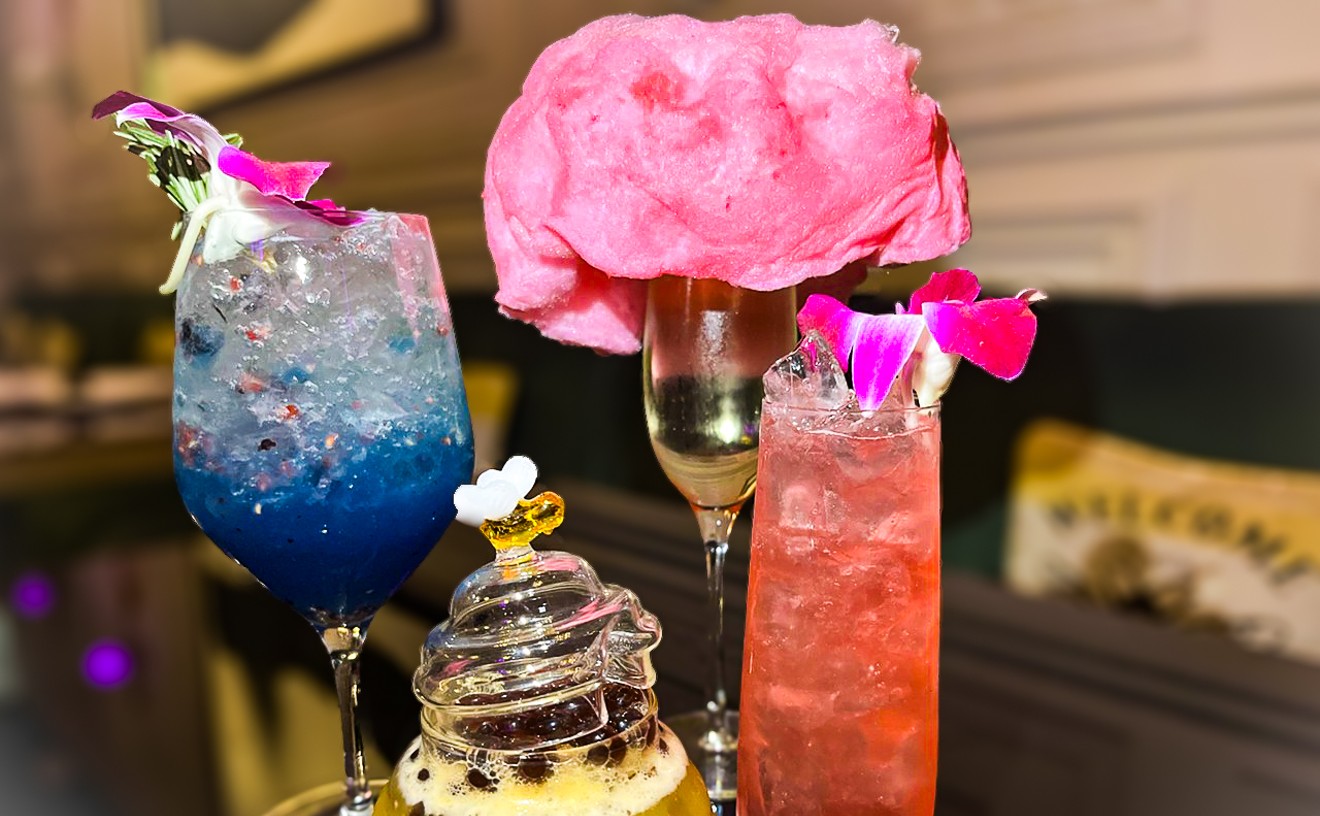We're still awaiting the inevitable war, and we know that, sooner or later, Spot will publish some best-selling philosophical tome. But everything else is recurring well ahead of schedule. The elder Bush, for instance, spewed chunks on Japanese dignitaries. W's submarines sank one of their ships.
It is--dare we say it--déjà vu all over again.
In one sense, then, the president himself inspired this week's Burning Question. During the boom years, Americans learned to appreciate some of the finer things in life--Viennese roasted Costa Rican coffees, aged prime beef, beluga caviar and the like. As the economy roars into full sputter and companies embark on a mad downsizing rush, the Burning Question crew began to wonder what happens when refined taste buds must economize.
In other words, can you find good cheap versions of fine foods?
To answer this question properly, we invited three of Dallas' best chefs and one of the area's top bartenders to join us for a taste test of cheap things. Al Biernat graciously offered to host the event. His restaurant, now known as Al's Prime Steak and Seafood, doesn't serve cheap stuff, of course. But we figured that elegant surroundings and attentive service would soften the harsh flavors of mediocre bourbon, cheap wine, prepackaged supermarket fare and cappuccino mixes.
To find inexpensive substitutes we scoured our editor's fridge after knocking him out with half a bottle of Blue Nun (editors are notorious lightweights). What we couldn't find in his cupboards we purchased--the food at Tom Thumb in Carrollton and Plano and the alcohol at Artic Liquor in The Colony (well, their business card reads that way; the receipt spelled it in the less exotic but more accepted fashion, "Arctic").
The guinea pigs in our unwanton extravaganza amounted to a who's who in the Dallas culinary world: Marc Cassel of The Green Room, Gilbert Garza from Suze, York Street's Sharon Hage and Matthew the Samba Room bartender.
These are people of exquisite taste and extraordinary talent. Who knew they could be so easily suckered into an event so unsavory, malodorous and otherwise objectionable?
Of course, we may have dressed those words up a bit in our invitation.
The Taste Test
During the 1990s, bourbon production reached its apogee as Maker's Mark, Woodford, Knob Creek, Blanton's and other boutique whiskeys targeted more sophisticated palates. Even midmarket brands such as Wild Turkey and Jack Daniel's (technically a sour mash because of its Tennessee roots) now market upscale versions. Unfortunately for our tasters, we purchased three less distinguished brands.
Private Cellar ($9.99) ranked...well, rank. "Maybe they should keep it private," Garza recommended. It tasted harsh, with any subtlety lost in a burning sting of alcohol. Cassel even questioned their basic recipe. "I can almost taste the radiator," he said. Rebel Yell ($13.99), a castoff from the high-end Weller distillery, fared slightly better. "It has a little bit of a caramelized sugar taste," said Hage, an avowed bourbon fan. "It's a cross between a cheap rum and a cheap bourbon."
Evan Williams ($9.99) was the clear favorite, a rough-hewn gem in a field of petrified dung. "It's a solid, basic bourbon," Matthew said after pondering his first sip. The others agreed, with the exception of Garza, who refused to tip his glass--something about the bottle and labeling resembling the familiar Jack Daniel's look and an ugly bout with Jack during high school. The others worked through any past emotional or stomach-churning hangover-related traumas. "It's not as bad as I thought it would be," Hage beamed, considering a second drink. "It doesn't suck," Cassel confirmed.
High praise indeed.
"There are certain things you can buy cheap and still find quality and certain things you can't," Matthew pointed out. "With bourbon, Evan Williams is a happy medium. With the cheese, you're far south of medium."
We brought four prepackaged goat cheeses to the tasting, none of which met with approval. They tasted bland and sometimes pasty, and at least one emitted a rather foul barnyard odor. "It doesn't say whether it was a healthy goat," Garza said, examining one of the labels. "Clearly it was abused as a child," Cassel said of one particularly evil cheese in the selection. Supermarket caviar--both the whitefish and the lumpfish varieties--also irked the panel. Garza twisted his face violently away from the stuff as his nose reacted to an overpowering stench of salt and dead fish.
"Buying this stuff is why people think they don't like caviar," said Hage.
Fortunately, Biernat trotted out some of the real thing. Good Russian beluga caviar pops in the mouth with a creamy and pleasant saltiness, at $85 or so an ounce. The supermarket junk ($6.39 to $9.99) forces involuntary muscle spasms. One member of the Burning Question crew actually reached for the bottle of Private Cellar bourbon, desperate for anything to kill the taste of unborn lumpfish.
Biernat's staff served up cappuccino mixes from General Foods, Hills Brothers and the like in style--glass mugs, chocolate spoons, the works. Surprisingly, the mixes lack any form of flavor but a vague taste we could only describe as "brown." Still, coffee sparked the event's only argument as Garza and Hage squared off, spoons in hand.
"It's hot brown water," Garza said of the cappuccino. "No, it's beige," Hage retorted.
OK, so you definitely cannot skimp on cappuccino, goat cheese or caviar. Decent wine, on the other hand, exists at almost every price point. For the purposes of this test, we narrowed the field to cabernets, set a price limit of $6 and sought out wines from the most popular name-brand vineyards: Ernest & Julio Gallo, Vendange, Sutter Home and Glen Ellen. Several very good cabs retail just a few dollars outside of this range, of course. A 1999 Caliterra Valle Central, for example, runs about $8. Todd Lincicome, wine director at Al Biernat's, suggested a 1998 Raymond Reserve or a 1997 Quail Ridge Reserve. "The best wines for value are Italian wines, and '97 for Italy was a great year," he added. "Oregon had a great year in '98. It's really about finding the good years."
The cheapest labels again fared poorly: Matthew refused to taste the Gallo ($4.99) after smelling it; Garza likened Vendange ($3.99) to sweet pickle relish; Glen Ellen ($6.99) "smelled like old varnish," according to Cassel. Sutter Home ($5.99) stood out as the best of the worst. "It was the least offensive," said Hage, "but they all had distinctively bad characteristics."
We paired the wines with frozen beef dinners from companies such as Stouffer's and Boston Market, all in the $3 range--another mistake, it seems. "It's Salisbury steak meets beef bouillon," said Garza in response to Hage's incredulous, "What form is this meat in?" The carrots did taste like carrot, and Matthew adjudged the peas to be "vibrant"--at least in color. Otherwise, salt and unidentifiable chemicals dominated the dishes. Ah, the wonders of artificial preservatives. Considering that beef tossed into canned and frozen foods ranks just above dog food and well below prime, it's no surprise that the servers steered clear of other restaurant guests when bringing out the main course, in order to shield them from the aroma.
The Conclusion
"Isn't it better to eat really good bologna than really bad steak?" Hage asked.
And that may be the lesson here. Once accustomed to prime steak or caviar or Starbucks coffee, the cheap alternatives only offend the palate. Over the last couple of decades, Americans opened up to worldwide influences and subtle flavorings. Dallas now offers world-class, chef-driven restaurants by the score. People across the United States recognize names such as Fearing, Spears, Rathbun, Ascolese, Hage, Garza and Cassel.
Finding cheap versions of fine items is possible, the chefs say. You just have to know where to look. "It's really a matter of trial and error," explained Hage. "It's not just buying the things you've heard of." We tested cheap on the extreme end, the stuff readily available to consumers, the name brands. Unfortunately, we've developed taste.
"A lot of things you can't go backward on," Cassel warned.
In other words, if history holds true and a recession ensues, we're screwed.










